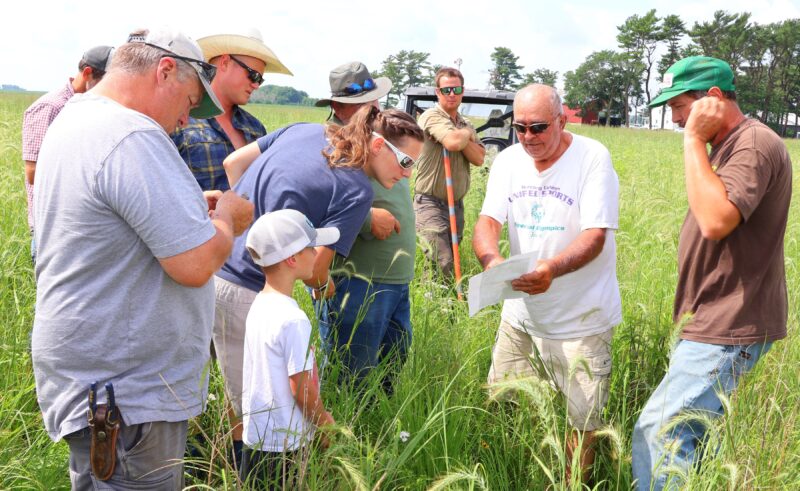Note: This commentary originally ran in the Minnesota Star Tribune on Oct. 17.
When Minnesota’s growing season draws to a close, so does another kind of season: that period between spring and fall when farmers invite other farmers onto their land for “field days,” so they can share ideas about what’s working and what isn’t. Such events are particularly popular among farmers who are practicing regenerative agriculture, that form of production that diverges from the high-input, industrialized approach and uses soil biology to build fertile organic matter, protect water and generate climate resiliency.
This year marks my 30th as an observer of regenerative ag field days in the Upper Midwest, and the wrapping up of this year’s season coincided with the release of the latest report by federal Health and Human Services Secretary Robert F. Kennedy Jr.’s Make America Healthy Again commission.

I’d heard rumblings that it mentions practices that are considered part of regenerative farming, so upon my return from a field trip to Wisconsin, I sat down to read it. Sure enough, there on page 18 of the 19-page “Make Our Children Healthy Again” strategy document, past the references to vaccines, fluoride in water and the “overmedicalization” of kids — maybe saving the best for last — is a section called “Soil Health and Stewardship of the Land.”
It names USDA initiatives that help farmers employ soil-friendly practices like cover crops, no-till and rotational grazing. Establishing pollinator habitat is mentioned, an acknowledgement of agriculture’s reliance on eco-services. Prescribed grazing — the practice I had just spent the day observing — is name-checked. It’s all pretty vague, but still, it’s there.
For a moment, regenerative agriculture is getting some attention in a report that’s getting lots of attention. There’s nothing new about this kind of farming — Indigenous peoples have long practiced versions of it. But regenerative farming has received a country kickstart thanks to recent revelations related to the soil biome. It turns out that by returning diversity — above and below ground — to the land in the form of crop rotations, multispecies cover-crop mixes and rotational grazing of perennial forages, farmers can increase organic matter (the living part of the soil so key to plant growth) in a matter of years, rather than millennia. That means fewer expensive chemical inputs need to be applied to the land, which results in more carbon in the ground and fewer pollutants in the water.
At field days, I’ve talked to hundreds of farmers who range widely in their regenerative agriculture rootedness — some are otherwise conventional producers looking for a tweak to help them grapple with increasingly extreme weather. They’re “toe-dippers” — folks testing the soil-health waters to see if they can learn something to take home. Others are “early adopters” or “true believers” in a more ecologically based form of farming. Widely divergent political views also prevail: Conservatives cringe at the idea of accepting USDA funds to plant cover crops; others see government support as integral to transforming an unsustainable system.
Their point of agreement: Soil health is the key to farming’s future — like the glomalin that holds soil aggregates together, it’s the glue that binds, whether the goal is economic stability, yield consistency or just a more enjoyable way to make a living.
Farmer-to-farmer networking is so intertwined with regenerative agriculture because the institution historically responsible for transferring ag innovations to the field — the land grant system — can be less than supportive of non-conventional agriculture. Iowa State’s influential Leopold Center for Sustainable Agriculture was defunded in 2017; the U of M’s Minnesota Institute for Sustainable Agriculture faces a similar fate. These events aren’t just venues for exchanging technical information — they are morale boosters for farmers who often feel isolated.
“Why am I here?” Mike Rupprecht, a grass-based beef producer and organic crop farmer, asked himself at the outset of one recent field event in Minnesota’s Fillmore County. “Because I love being around people who are farming like this.”
For all those farmers having intense conversations about mycorrhizal fungi, do a few words in a government report matter? As the Minnesota Star Tribune reported on Oct. 2, the document ignores putting limits on agrochemical pollution and relies on voluntary measures to make agriculture healthy again. But voluntary efforts can go only so far to “empower farmers,” as the report puts it, without boots on the ground.
The report recommends “Emphasizing and prioritizing conservation technical assistance … .” That runs counter to what Agriculture Secretary Brooke Rollins has been doing to farm conservation programs and the Natural Resources Conservation Service, the agency responsible for administering them. For a time, soil conservation contracts with farmers were frozen, and Rollins has eliminated funding that promotes “climate-friendly” agriculture.
Before regenerative ag involves more farmers — not just those who attend field days — we’ll need public resources to support this public good. A field day provides a positive peek at farming’s possibilities, but for now they are just that — possibilities. The Census of Agriculture says less than 5% of U.S. cropland is protected by cover crops, for example. The road to a different kind of agriculture is still trod mostly by the toe-dippers, early adopters and true believers.
For now, all those farmers gleaning new ideas while hiking their neighbors’ acres can at least claim a moral victory in having “Soil Health and Stewardship of the Land” snag a section in a major government report. It can get lonely out in the field — an occasional shoutout from the Washington crowd doesn’t hurt.
Brian DeVore is the editor of the Land Stewardship Letter, host of the Ear to the Ground podcast and author of Wildly Successful Farming: Sustainability and the New Agricultural Land Ethic.



